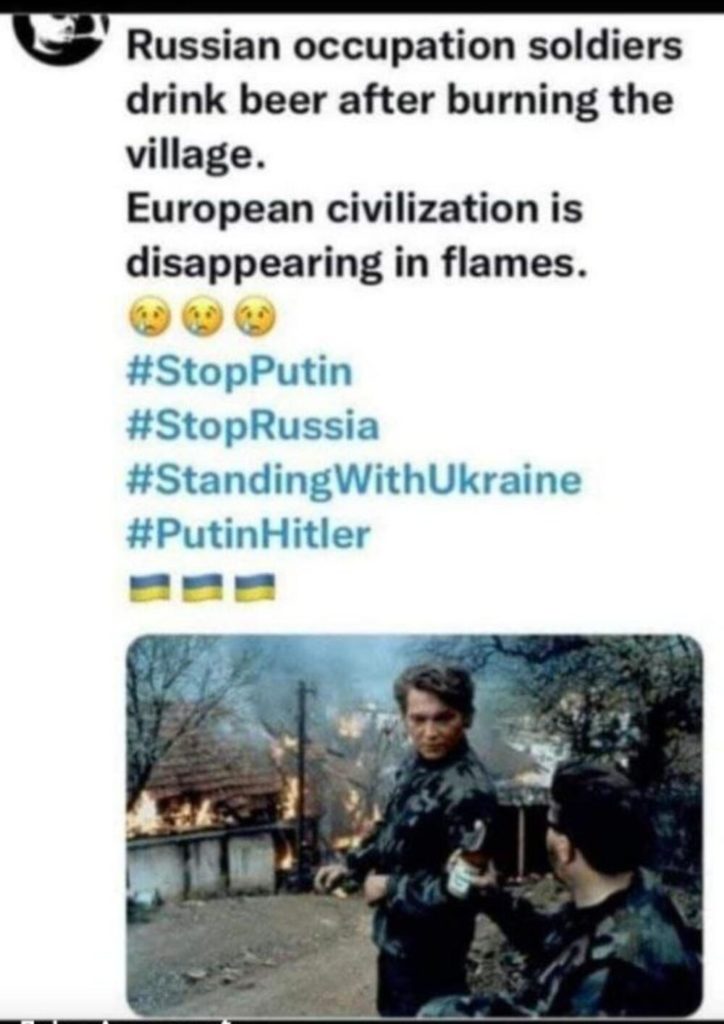Original article (in Bosnian) was published on 09/03/2022
Twitter trolls who portrayed actors from Serbia as soldiers in the Ukrainian army were presented in some media as “Ukrainian propagandists”, although it is evident that this is not true based on their accounts.
On March 2, the website Kurir published an article entitled:
SPOOKY! BJELOGRLIC AS A RUSSIAN OCCUPIER: He burns Ukrainian villages and drinks beer! Another actor victim of PROPAGANDA WAR (PHOTO)
The article claims the following:
For several days, along with the real war in Ukraine, there is also a propaganda war on social media.
We have seen how the world media used last year’s photos of Ukrainian President Zelensky to show how he is currently in the trenches on the battlefield, and now a scene from the movie “Lepa sela, lepo gore” is used to showcase the suffering of the Ukrainian people.
Dragan Bjelogrlic is the main villain, and in the background is the scenography of burning houses that was supposed to evoke the war atmosphere in Bosnia in the 1990s, and Ukrainian propagandists used this to show Russian occupying soldiers burning villages and drinking beer.
The article is equipped with a screenshot of a tweet showing a scene from “Lepa sela, lepo gore” movie.

Translation of the tweet: Russian occupation soldiers drink beer after burning the village. European civilization is disappearing in flames. #StopPutin #StopRussia #StandingWithUkraine #PutinHitler
Kurir then referred to the alleged source of this tweet:
This post was first published on the Twitter profile of Ukrainehouse (@TheUkrainehouse) and immediately provoked many reactions, people condemned the destruction of Ukraine by Russian troops, and they condemned President Putin.
Kurir also referred to two other similar posts. One of them is a tweet in which Rados Bajic, an actor from Serbia, is presented as the “Ghost of Kyiv” – a Ukrainian pilot who (without independent confirmation) claims to have shot down six Russian planes. The second is a tweet in which the actor Nikola Kojo is introduced as a “hero from Ukraine”.
Claims that the photo from the movie “Lepa sela, lepo gore” is about Ukrainian propaganda was also shared by the Russian Ministry of Foreign Affairs on its official Twitter account. The websites Serbian Times and Radio Sabac shared the same claims. The website Srbin Info claimed that such publication is about “NATO propaganda”.
What are the facts?
AFP fact-checker Marion Dautry posted on Twitter analysis of claims that it was “Ukrainian propaganda” or “Russophobic propaganda promoted by the mainstream media”, as stated by the Russian Foreign Ministry.
Dautry states that a tweet whose screenshot appeared as “evidence of Ukrainian propaganda” in Kurir’s article and in a Russian Ministry of Foreign Affairs post was published on the account called MilanCHE111 on February 28 2022. Based on the account description, this is a user from Serbia who lives in Belgrade.

The tweet is not available to all users, as this account is not currently public. However, the available archive of other tweets from this account reveals that most were written in Serbian, with some tweets about Ukraine in English. Based on the responses to available tweets, Dautry concluded that this user takes photos of other people and events and presents them as events in Ukraine. These are obvious and easily noticeable lies, which can be concluded based on the numerous responses to these tweets.

Also, there are no indications that the account owner is someone from the “mainstream” media or an organization related to Ukraine.
In its article, Kurir states that the same tweet is the work of TheUkrainehouse. A Google search of the words “Russian occupation soldiers drink beer after burning the village” mainly reveals allegations citing the aforementioned tweet by MilanCHE111 or a tweet by the Russian Foreign Ministry. Also, one can find a screenshot of the tweet on the account TheUkrainehouse, which Kurir claims was the first to publish it. Raskrinkavanje could not find the tweet in question, as it may have been deleted in the meantime. Also, since the screenshot does not contain information about when the potential tweet was posted, it is not possible to determine who first posted the tweet.
The other two cases, which are part of Kurir’s article, are almost identical. One is a tweet in which Rados Bajic, an actor from Serbia, is presented as the “Ghist of Kyiv”. However, on the account Malign Influence Enjoyer, where the tweet was published, tweets are published in Serbian and English, and the account owner is from Serbia. The same goes for the tweet in which the actor Nikola Kojo is presented as a “hero from Ukraine”. As in previous cases, the account owner that published the tweet is from Serbia and the same account tweets both in Serbian and English.
In all three cases, they are internet trolls from Serbia who are satirically trying to deceive others on the Internet. It is not possible to know the motivations of the owners of these accounts, but what is certain is that none of these three trolling cases was the work of the “mainstream” media or “Ukrainian propagandists”. The media that presented it in this way are, in fact, among the few who, intentionally or accidentally, stumbled upon trolling.
Internet trolls are people who publish incendiary, dishonest and disinformation or things that deliberately divert them from the topic of conversation in online communities, such as social networks or forums. Such actions aim to provoke an emotional reaction in others or lead others to wrong conclusions. The motivation for such actions is usually one’s entertainment or achieving a specific result, such as disrupting the rival’s online activities or manipulating the political process.
We rate the claim suggesting that “Ukrainian propagandists” used photos of actors from Serbia to show their involvement in the Russian invasion of Ukraine and that this is an anti-Russian campaign or propaganda, as disinformation.

